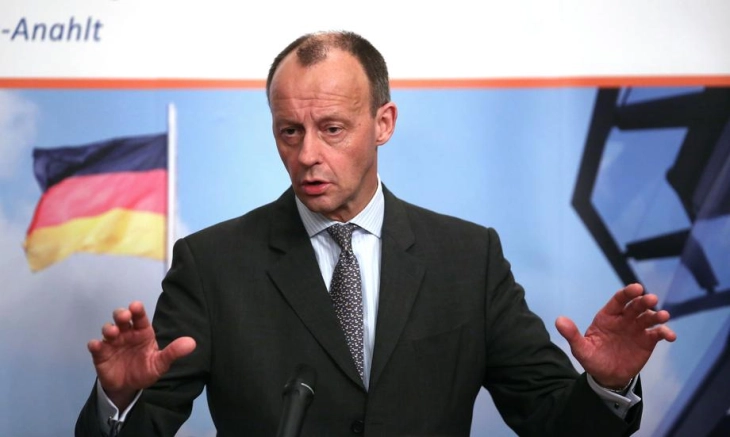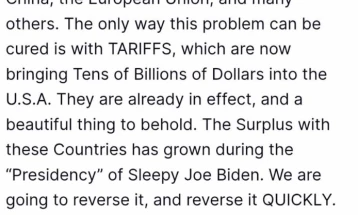Germany's Merz: Defence targets like Trump's 'basically irrelevant'
- Friedrich Merz, the frontrunner to become Germany's next chancellor, said defence spending targets should be aligned with actual needs instead of abstract figures, after US President-elect Donald Trump demanded NATO members spend 5% of GDP on defence.

Berlin, 8 January 2025 (dpa/MIA) - Friedrich Merz, the frontrunner to become Germany's next chancellor, said defence spending targets should be aligned with actual needs instead of abstract figures, after US President-elect Donald Trump demanded NATO members spend 5% of GDP on defence.
"The 2%, 3% or 5% are basically irrelevant: What is crucial is that we do what is necessary to defend ourselves," Merz, who leads the conservative Christian Democratic Union (CDU) party, told the radio station Bayern 2 on Wednesday.
His comments come after Trump on Tuesday said that NATO countries should be spending 5% of gross domestic product (GDP) on defence, up from the current 2% target.
Trump, who returns to the White House on January 20, has long been a critic of NATO, claiming that many European members are free-riders who don't pay their way, relying instead on US taxpayers.
According to NATO estimates last year, 23 members were expected to meet or exceed the 2% of GDP target in 2024.
The German government has reported defence spending of around €90.6 billion ($94.9 billion) for 2024. According to estimates from June, this could correspond to a share of GDP of around 2.1%.
When asked about Trump's latest demand, Merz said: "We must first of all achieve the 2% as a lower limit in Germany. We are not there yet."
Germany had only "formally" met the 2% target because spending from a special fund set up following the Russian invasion of Ukraine was currently being included.
The special €100 billion fund intended to modernize and ramp up Germany's armed forces is expected to be depleted by 2027.
Merz, whose conservative bloc is currently polling in first place ahead of early elections on February 23, said the important thing was to focus on restoring national and alliance defence capabilities.
"We have to make a joint effort here in the next few years and the yardsticks for measuring what proportion of an economy's gross domestic product is allocated to defence are only variables," he added.
Conservative allies divided
The leader of the Christian Social Union (CSU), the CDU's sister party in Bavaria, disagreed with Merz's assessment, calling for a defence spending target of "well above 3%" of GDP.
Whether meeting Trump's demand of 5% was possible had to be assessed, Markus Söder told broadcasters RTL/ntv on Wednesday.
However, he said ramping up defence spending to "well above 3%" of Germany's GDP had to be a given.
Senior CSU lawmaker Alexander Dobrindt on the other hand said that Trump's demand was "not realistic" and should therefore not "be taken 100% seriously."
He pointed out that even the US itself was not spending 5% of GDP on defence, meaning the figure would also be unrealistic for Germany.
"For Germany, that would mean around €180 billion per year, as things stand today," Dobrindt said.
NATO estimates the United States spent about 3.38% on defence in 2024 - well under 5%.
A decision on new spending pledges is expected to be made at the alliance's summit next June.
The US president-elect's latest comments show that NATO allies were heading for a challenging debate with Trump, said Dobrindt.
Regardless, he said he believes that in the future, the debate on defence spending will shift away from targets but focus more on individual NATO members being able to provide specific military capabilities.
Far left opposes more defence spending
The leader of Germany's The Left party, meanwhile, vehemently opposed Trump's latest demand, with its leader Jan van Aken instead telling dpa that the party is in favour of freezing defence spending at the current level instead.
"In 2024, the defence budget was €52 billion – together with our European partner states, that is perfectly adequate for national defence," van Aken said.
Van Aken echoed the comments made by conservative leader Merz, saying that measuring defence spending by GDP was "nonsense."
In the event of an economic crisis, GDP and thus the defence budget would fall, he pointed out.
"Defence spending must be measured in terms of need, not GDP."
Van Aken also warned against European nations allowing themselves to be blackmailed by Trump. Instead, it made sense to think of security in European tearms, he said.
The Left party currently polls at around 3%, meaning it could fail to pass the 5% usually needed to enter Germany's parliament.
MIA file photo











